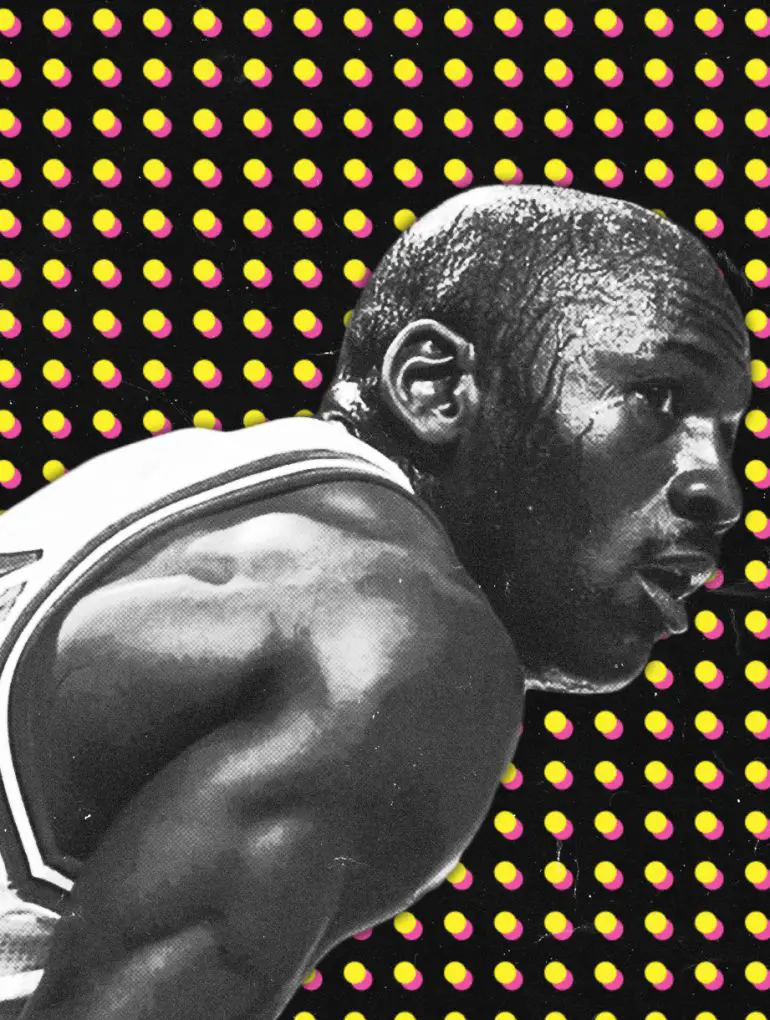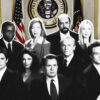ESPN’s The Last Dance, the network’s five-week, ten-part documentary about Michael Jordan’s six-championship run with the Chicago Bulls in the 1990s, wrapped up Sunday night. It was a ludicrously entertaining and constantly thought-provoking rampage through that era of the NBA. It not only provided some sports content at a time when there’s none of it, but The Last Dance, for the last five Sunday nights, has provided a group viewing experience that I had thought was a thing of the past.
I was in junior high, high school, and college for the Bulls’ run, and I mostly associate it with arriving at a summer camp each June, where 80 percent of the attendees were from Chicago, and the kids would receive their Bulls championship shirts on the same day. I had one camp friend who could do a dead-on impression of Bill Cartwright, and another who could never enter a room with a piano without sitting down and playing “Sirius.”
The show, successful as it’s been, has been one of the most talked-about events of the year, and has also led to various controversies. Here’s a brief overview of my thoughts on them.
And no, I have absolutely no interest in litigating the issue of how Michael Jordan and the Bulls compare to LeBron James, or any other superstars of today, or who would win a hypothetical playoff series. This is one of the stupidest and most pointless possible sports topics, it always has been, it always will be, and there’s no reason to discuss it.
Michael Jordan, Executive Producer
The Last Dance comes with a humongous grain of salt: Michael Jordan’s production company had a hand in producing it, and the long-vaulted footage from the 1997-’98 season that makes up much of the doc was only released because Jordan approved of its use.
Some, including Ken Burns, have denounced this arrangement, calling it contrary to the ethics of documentary filmmaking, though to be fair Burns made those comments without seeing the film, and he’s made his own lapses in his own multipart TV documentaries.
It’s not as though this fact is hidden, but anyone watching should have it in the back of their mind that what we’re seeing is Michael Jordan’s side of the story, and every minute of it is approved by him.
However, we can give Michael credit for being willing to make himself look like a huge prick much of the time, sort of like how Steve Jobs cooperated near the end of his life with a biography that was full of stories about what a huge asshole he was.
Jordan also says things in the interviews that are memorable and non-canned, which is more than one can say for the vast majority of televised interviews he’s given during and since his NBA career. He even makes news – who knew the flu game was caused by bad late-night pizza, and not the flu?
Basketball Was Different Then
I’ve observed before that when my friends and I played basketball back in the day, everyone wanted to be Michael Jordan, hitting the heroic shot and even dunking if the basket was low enough. When my kids and their friends play, everyone wants to be Steph Curry, and hit the longest three-pointer they can.
Basketball in the ’90s was a very different game. Rebounding was really important, in a way that it isn’t much today, while three-pointers weren’t as big a part of the game. It’s hard to imagine anyone with Dennis Rodman’s skill set of being a great defender and rebounder who never shoots becoming a Hall of Famer in today’s league. Speaking of my kids, their intramural basketball games much more resemble the ’90s style of the NBA than today’s – most of them can’t shoot, but there’s always a great deal of physicality under the basket, and every team has to have at least one mini-Charles Oakley.
Was it better then? Or now? That’s not the point. It’s just very different. Speaking of which…
Is Dennis Rodman interesting?
One of the stupider debates of the Jordan doc began when The Ringer’s Bill Simmons, who during his ESPN tenure created the 30 for 30 documentary series that served as the forerunner for The Last Dance, tweeted a surprising question: “Why have we pretended for the past 25 years that Dennis Rodman was actually interesting?”
True, Rodman didn’t have a lot of memorable things to say, when he was interviewed for the doc, at least not as much as he did in his own 30 for 30 episode last year.
But Rodman? Not interesting? He played on two different legendary teams, the Bad Boy Pistons and the 70-win Bulls, and made the Hall of Fame without ever being able to shoot. He dated Madonna, dyed his hair weird colors, skipped off to Vegas during a season, occasionally dressed in drag, went to WCW as a member of the NWO – DURING THE FINALS, and about 50 other things that no one but Rodman ever did.
As Nick Wiger joked on Twitter, calling Rodman not interesting is like calling Shaq not big.
Those Dream Team Practices
The whole Dream Team section of the documentary is pure gold, starting with those scrimmages, which I’ve been hearing about for much of my life but always assumed no footage existed of it. Surprise! Some does!
Michael vs. Isiah
As The Last Dance demonstrates repeatedly, the NBA, in the ’90s, was about all pettiness, all the time. But my goodness, did Jordan hate Isiah Thomas with the fire of a thousand suns.
If anyone’s post-playing career has been an embarrassment, it’s Isiah’s, between his terrible GM and coaching stints and that sexual harassment scandal when he ran the Knicks. Leave it to the shell-of-its-formal-self Deadspin, for treating Isiah like some kind of hero because he didn’t disown his gay son.
The Jordan Family
There’s much in The Last Dance about Jordan’s parents, especially a long section about his father’s death, and his mother and brother are interviewed. But didn’t Jordan have a wife and three kids for the entire championship run? They’re barely seen or mentioned in the entire 10 hours. They’re invisible in the old footage, and the three kids are only briefly interviewed in the final episode.
That Boomer Meme
Speaking of Jordan’s mom, at some point during The Last Dance, an outstanding boomer meme crossed my Facebook, noting that Jordan hadn’t made his high school team in 10th grade, and that “his mom told him to work hard all summer – she did not call the coach, athletic director and superintendent to complain.”
Because clearly children must take further lessons from Jordan’s behavior as demonstrated in The Last Dance, starting with holding permanent angry grudges against the majority of people in their lives, and spending every waking moment engaging in high-dollar wagers.
Bullying Jerry Krause
One through-line of the documentary is that Jordan and his teammates were extremely disdainful of Jerry Krause, who was the Bulls’ general manager for the team’s entire run. Sure, Krause deserves plenty of criticism for the way he tried to break up the team after ’98, but the deeply personal insults are a bit much, especially since Krause, alone among major figures from the Bulls dynasty, isn’t still alive. Sure, the guy was fat and slovenly and didn’t exactly have a robust basketball background. But he also played a key role in building teams that won six championships.
Coming off even worse in The Last Dance is Jerry Reinsdorf, then, as now, the owner of both the Bulls and White Sox. He says at one point that the baseball owners using replacement players in 1995, the event that led Jordan to quit baseball, was “a really dumb idea.” Which is pretty hilarious, since Reinsdorf was, along with Bud Selig, the ringleader of baseball’s ’94-’95 work stoppage, and using replacement players was more or less their idea.
“Republicans buy sneakers, too”
The film addresses the “Republicans buy sneakers, too” controversy, and the big headline was that Jordan for the first time acknowledged that he had actually said it (the quote was long thought to be somewhat apocryphal).
On the one hand, yes, it probably would have been better if Michael Jordan had spoken out against Jesse Helms, one of the most singularly vile bigots in the past 50 years of American political history. On the other hand, that wasn’t a time in history when most star athletes were outspoken about anything political, nor was Jordan particularly comfortable being a political activist at that point in his life.
At any rate, Harvey Gantt said last week that he has no ill will towards Jordan. Helms could not be reached for comment since he’s been dead for 12 years, though he sadly died five months before the election of the first black president, Last Dance talking head Barack Obama.
Continuity
I heard some complaints from some watching the show that they couldn’t easily follow the timeline of the documentary. I didn’t have this problem, although granted I lived through all this stuff, and I can generally tell what year it was by, say, whether Horace Grant or Dennis Rodman was on the team at the time. Also, the doc showed the year on the screen whenever it went backward or forward in time. It wasn’t like Netflix’s Aaron Hernandez doc earlier this year, in which the timeline was practically incoherent.
The “Gambling Suspension”
It’s basketball’s most famous conspiracy theory: That Michael Jordan’s 18-month retirement from 1993 to 1995, during which he became a mid-level minor league baseball player for the Chicago White Sox, was in fact not a retirement but a secret suspension, levied by Commissioner David Stern due to Jordan’s gambling.
In the doc, this is denied by everybody involved – including the since-deceased Stern – and it’s really hard to imagine why such a suspension would have been a secret, especially since the NBA clearly wished all along for Jordan to come back as soon as possible, and it would be pretty impossible for that big a secret to have been kept for what’s now been 25 years. I think we can safely put this one to bed.
The Patrick Ewing frozen envelope theory, though? I believe that.
Wizards/Bullets
Hackles were raised in the first episode of The Last Dance when the Eastern Conference standings from the 1986 season listed the “Wizards,” even though the team was called the Washington Bullets at the time, in a mistake that was later corrected for future airings.
Was this “political correctness” on ESPN’s part, as some asserted? Unlikely. I’d say it’s more likely the mistake was the result of a brain fart by some 21-year-old production assistant, who was asked to make a graphic of the ’86 standings, saw “Washington,” and either forgot or never knew the team was called the Bullets then.
Either that, or all five production entities involved in the making of The Last Dance – including the one controlled by the notoriously apolitical Michael Jordan – all conspired to make that one extremely subtle change.
After the Dance
My only major complaint – why no depiction of what happened with all of the principals after 1998? I could have watched a whole other hour about Jordan’s Wizards tenure, Phil Jackson with the Lakers (and the Knicks), Dennis Rodman’s North Korea adventures, Jerry Krause retreating to baseball scouting, and of course the shitshow that the next decade of the Bulls was.




